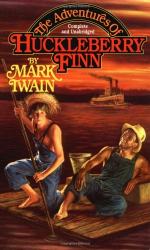|
This section contains 9,365 words (approx. 32 pages at 300 words per page) |

|
SOURCE: Bollinger, Laurel. “Say It, Jim: The Morality of Connection in Adventures of Huckleberry Finn.” College Literature 29, no. 1 (winter 2002): 32-52.
In the following essay, Bollinger focuses on the theme of connectivity in the The Adventures of Huckleberry Finn.
The American literary tradition has often been defined by its moments of radical autonomy—Thoreau at his pond, Ishmael offering his apostrophe to “landlessness,” Huck “light[ing] out for the Territory ahead of the rest” (Twain 1995, 265). In fact, Twain's novel is often taught as the text that epitomizes this tradition, with Huck held up as its exemplar: a boy courageous enough to stand against the moral conventions of his society, to risk Hell itself rather than conform to the “sivilizing” process of communities he rejects.1
Yet such a focus belies an alternate strand in the tradition: moments of radical connection that call into question not just the value but even...
|
This section contains 9,365 words (approx. 32 pages at 300 words per page) |

|


